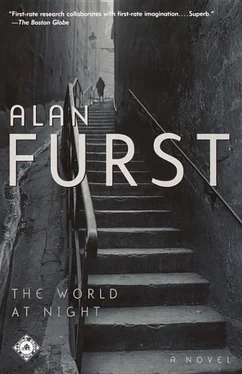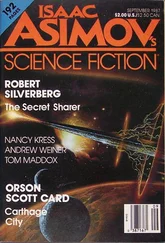Alan Furst - The World at Night
Здесь есть возможность читать онлайн «Alan Furst - The World at Night» весь текст электронной книги совершенно бесплатно (целиком полную версию без сокращений). В некоторых случаях можно слушать аудио, скачать через торрент в формате fb2 и присутствует краткое содержание. Жанр: Шпионский детектив, на английском языке. Описание произведения, (предисловие) а так же отзывы посетителей доступны на портале библиотеки ЛибКат.
- Название:The World at Night
- Автор:
- Жанр:
- Год:неизвестен
- ISBN:нет данных
- Рейтинг книги:5 / 5. Голосов: 1
-
Избранное:Добавить в избранное
- Отзывы:
-
Ваша оценка:
- 100
- 1
- 2
- 3
- 4
- 5
The World at Night: краткое содержание, описание и аннотация
Предлагаем к чтению аннотацию, описание, краткое содержание или предисловие (зависит от того, что написал сам автор книги «The World at Night»). Если вы не нашли необходимую информацию о книге — напишите в комментариях, мы постараемся отыскать её.
The World at Night — читать онлайн бесплатно полную книгу (весь текст) целиком
Ниже представлен текст книги, разбитый по страницам. Система сохранения места последней прочитанной страницы, позволяет с удобством читать онлайн бесплатно книгу «The World at Night», без необходимости каждый раз заново искать на чём Вы остановились. Поставьте закладку, и сможете в любой момент перейти на страницу, на которой закончили чтение.
Интервал:
Закладка:
25 June, 1941.
“Good morning.”
“Good morning. I was wondering if you have, a certain book.”
“Yes? What would that be?”
“An atlas.”
“Yes? Of what country?”
“France.”
“Perhaps, we could call you back?”
“No. I’ll be in later.”
“But sir …”
He hung up.
Not the same person, and, he thought, not French.
German.
25 June, 1941.
The baroness answered the phone in a cool, distant voice. “Hello?”
“Hello. This is your neighbor, from upstairs.”
“Oh. Yes, I see. Are things going well? For you?”
“Not too badly. My friend?”
“Your friend. Has returned to Lyons. I believe, without difficulties.”
“I’m glad to hear it.”
“You are, you know, very fortunate to have such a friendship.”
“Yes, I do know that.”
“In that case, I hope you are careful.”
“I am. In fact, I ought to be going.”
“Good-bye, then. Perhaps we’ll meet again, some day.”
“Perhaps we will. And, madame, thank you.”
“You’re welcome, monsieur.”
25 June, 1941.
“Galeries Lafayette.”
“Good morning. I’m calling for Veronique, in the buyers’ office.”
“One moment, please.”
“Hello?”
“Hello, may I speak with Veronique, please.”
“I’m sorry, she hasn’t come in today, perhaps she’ll be in tomorrow. Would you care to leave a message?”
“No, no message. I’ll call back tomorrow.”
“Very well. Good-bye,”
“Good-bye.”
A cafe in the Tenth, busy and crowded. Casson went back to his table. Took a sip of his chicory-laced coffee. The Lost King and his colleagues had been very generous, had given him a shirt, a cap, an old jacket, and a few francs. They had even hit upon a scheme to persuade the Gestapo that their intensive search of the building was likely to prove fruitless- one of the men who took care of the furnace had snuck upstairs to the street floor of the Interior Ministry and, simply enough, left a door open.
Still, kind as they’d been, Casson was in some difficulty. Everything was gone: apartment, office, business, friends, bank accounts, passport. He was down to fourteen francs and Citrine-who would be safe, he thought, as long as she stayed in Lyons and didn’t call attention to herself.
So then, he asked himself, what next? He imagined Fischfang, sitting across the table, ordering the most expensive drink on the menu. Now that the hero has given his pursuers the slip, what becomes of him? His uncle dies, he inherits. Casson looked at his watch, but there was nothing on his wrist.
He drank up his coffee, left a tip, and went out to the street. A clock in the window of a jewelry store said 10:10, Casson started walking. A long walk, from the 10th Arrondissement all the way across the river to the Fifth. He had no identity papers, so the Metro, with its snap searches, was dangerous. Besides, he thought, he really couldn’t afford the five sous it cost for a ticket.
A warm day, the city out in its streets. Casson hadn’t shaved, he pulled the worker’s cap down over one eye, walked with hands in pockets. Good camouflage, he thought. Women going off to the shops gave him the once-over-a little worn, this one, could he be refurbished? He took the rue Pavee in the Jewish district, past a chicken store with feathers floating in the air. He saw a tailor at work through an open shop door, the man felt his eyes, looked up from a jacket turned back over its lining, and returned Casson’s wry smile.
He crossed the Seine on the Pont d’Austerlitz, stopped for a time, as he always did, to stare down at the river. Still swollen and mud-colored from the spring rains, it rubbed against the stone piers of the bridge, mysterious in the rolls and swirls of its currents, opaque and dirty and lovely-the soul of its city and everybody who lived there knew it.
He worked his way around the rough edges of the Fifth, avoiding the eyes of Wehrmacht tourists, taking the side streets. The place Maubert was hard on him-the smell of roasting chicken and sour wine was heavy on the air, and Casson was hungry.
The cafe where he’d met Veronique earlier that spring was deserted, the proprietor rubbing a dry glass with a towel and staring hypnotized into the street. Casson stood at the bar and ordered a coffee. The owner jiggled the handle on the nickel-plated machine, produced a loud hiss and a column of steam, the smell of burnt chicory, and a trickle of dark liquid.
“Seen Veronique today?” Casson asked.
In return, an eyebrow lifted in the who-wants-to-know look. “Not today.”
“Think she might be in later?”
“She might.”
“Mind if I wait?”
“Fine with me.”
He waited all day. He took his coffee to the last table in the back, kept the cup in front of him, pored over yesterday’s newspaper, and, at last, broke down and spent three francs in a tabac for a packet of Bulgarian cigarettes.
A workers’ cafe, Veronique had called it. Yellow walls dyed amber with smoke, slow, steady stream of customers-a red wine, a beer, a coffee, a marc, a fine, elbows on the bar. At six, some students came down the hill and stood in a crowd by the door, imitating one of their professors and having a good loud laugh. Casson looked a second time, and there was Veronique, in the middle of it, getting an envelope from the owner.
She was startled when he appeared next to her. Then she nodded her head toward the square. “Let’s go for a walk, Jean-Claude.”
They walked from cart to cart in the Maubert market, pretending to shop, staring at baskets of eels and mounds of leeks. Casson told her what had happened to him, Veronique said he’d been lucky. As for her, she’d been warned in person, at the office. “I’m leaving tonight, Jean-Claude. I just stopped at the cafe for a final message.”
“Leaving for where?”
“South. Over the mountains.”
They were standing in front of a mound of spring potatoes, red ones, the smell of wet earth still on them.
“Jean-Claude,” she said. “I want you to go to number seven, in the rue Taine. Immediately. The man there will take care of you. You know where it is?”
“No.”
“Bercy. Near the wine warehouses.”
“All right.”
An old man in an ancient, chalk-striped suit strolled over to the potato cart and stood near them, just close enough to overhear what they might be saying. Casson wanted to bark at him, Veronique took his arm and walked him away. “Oh this city,” she said in a low voice.
They stood in front of a barrow filled with dusty beets, the little girl minding the store was no more than eleven. “Ten sous, ‘sieur et ‘dame,” she said hopefully.
Veronique took a breath and let it out slowly. Casson could tell she sensed danger. “So now,” she said quietly, “we’ve done this shopping, and, old friends that we are, it’s time to part. We’ll kiss each other farewell, and then we’ll go.”
Casson turned to her and they kissed left and right. He saw that her eyes were shining. “Good-bye, my friend,” she said.
“Au revoir, Veronique.”
The last he saw of her, she was walking quickly through the crowd in a narrow lane between market stalls. Just as she turned the corner, she gave him a sudden smile and a little wave, then she vanished.
It was the sharp edge of the war on the rue Taine-an apartment of little rooms, all the blinds drawn, above a dark courtyard. There was a.45 automatic on the kitchen table, and a Sten gun in the parlor, candlelight a dull sheen on its oiled barrel. The operative was British, but nothing like Mathieu-this man was born to the vocation, and 1941 was the year of his life.
Читать дальшеИнтервал:
Закладка:
Похожие книги на «The World at Night»
Представляем Вашему вниманию похожие книги на «The World at Night» списком для выбора. Мы отобрали схожую по названию и смыслу литературу в надежде предоставить читателям больше вариантов отыскать новые, интересные, ещё непрочитанные произведения.
Обсуждение, отзывы о книге «The World at Night» и просто собственные мнения читателей. Оставьте ваши комментарии, напишите, что Вы думаете о произведении, его смысле или главных героях. Укажите что конкретно понравилось, а что нет, и почему Вы так считаете.












